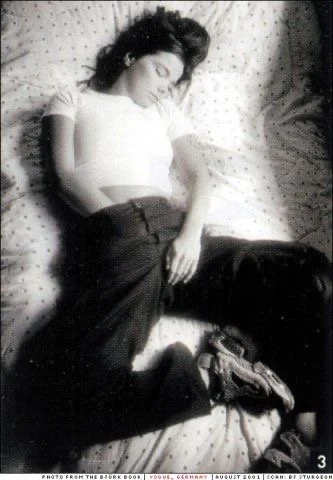Vespertine: Bjork’s Introvert Album
You’ve probably never heard of my favorite Björk album, Vespertine (2001). It lives a pretty quiet existence—which is fitting for an album that Björk calls “the shy, introverted one”. In 2001, Björk was at the height of her career. Her previous three albums, Debut (1993), Post (1995), and Homegenic (1997), received high-praise and critical acclaim. MTV worshipped her. She was on the cover of every magazine. And she received a Golden Globe Award and an Academy Award nomination for her role and music in Dancer in the Dark (2000). It’s the level of fame most artists only dream of, but Björk isn’t like most artists. For a quiet Icelandic girl with lyrics like “I thrive best hermit style, with a beard and a pipe,” the intense spotlight became too much to handle.
Björk experimented with an extroverted lifestyle and even enjoyed it. On her new podcast Sonic Symbolism, she talks about her time in London in the late ‘80s and early ‘90s — a time when she was uncharacteristically social, collaborating and partying with many different artists — and how you can hear the playful exuberance but also the randomness of that period in Post. For her following album, Homegenic, she wanted to maintain that intense ego, but this time she craved cohesiveness. The album captures the essence of her homeland, Iceland. It’s raw and explosive, like an Icelandic volcano, with fiery, confrontational arrangements. Songs like “Bachelorette” and “Joga” are bold and experimental, juxtaposing harsh, pulsating electronic beats with lush orchestral strings. The intensity of the music builds slowly, gradually increasing in pressure until it reaches its climax with the song “Pluto” and ends with “All Is Full of Love,” a gentle comedown that introduces us to the balmy euphoric feel of her next album, Vespertine.
Homogenic was a striking, new direction for Björk—it showcased her unique, innovative talents as an artist. For Vespertine, she would continue to stretch the possibilities of sounds, but this time, in the opposite direction. She’d had enough extroversion and craved the quiet intimacy of home. Rather than producing loud, bombastic songs, she experimented with microbeats—tiny sounds that she could create at home on her laptop —without the need for a studio. This was the era of Napster, and rather than being a victim, Björk leaned into it, experimenting with music designed for shitty computer speakers and headphones. Homespun sounds like the shuffling of cards, wood tapping, and ice crackling are brilliantly layered on top of the panoramic sounds of instruments like the harp, celeste, clavichord, and even a music box, resulting in a kind of electronic chamber music. If ASMR (Autonomous Sensory Meridian Response) had been a thing back in the late ‘90s, Björk would be credited as being one of the firsts to introduce it to popular culture.
Initially, she thought the album would be called Domestica for its intimate domestic feeling, but ultimately she decided on Vespertine —which means “of the evening,” a word that encapsulates the record’s hushed, erotic undertones. One of my favorite Björk explanations of Vespertine is that it’s like the thrill of someone whispering a secret in your ear. It’s quiet and hidden—something that happens privately at home—in the dark of night. This eroticism is most obvious in “Cocoon,” but you can feel it subtly pulsating throughout the entire album. One of my favorites is “Hidden Place,” a song about hiding in the air of a lover. It’s sung in a whisper; it’s a secret—one she plans to keep to herself. The soaring voices of the celestial choir, contrasted against Björk’s jagged, emotional singing, give the listener access to the evocative feeling of a secret relationship.
Now I have been slightly shy
And I can smell a pinch of hope
To almost have allowed
Once fingers to stroke
The fingers I was given
To touch with but careful, carefulThere lies my passion, hidden
There lies my love
I'll hide it under a blanket
Lull it to sleepI'll keep it in a hidden place
Björk takes tiny, obscure microbeats and magnifies them into vibrant sensations. It’s one of the reasons I love Vespertine so much. Not only does it speak to my introverted, homebody ways, but it’s also about sensual, elicit feelings. You know how ASMR ignites a tingling feeling throughout the body? Vespertine does that too. Desire, masturbation, sex, secrets—they all can produce an overwhelming euphoric sensation.
You hear this overtly in the track “Cocoon.”
He slides inside
Half awake, half asleep
We faint back
Into sleephoodWhen I wake up
The second time
In his arms
Gorgeousness
He's still inside me
The ability to have the entire album on her laptop and in her control liberated Björk—like being sexually woke. She could finally define for herself what felt good and exciting. And her deep, underlying desires come to the surface and climax in “Pagan Poetry.”
Morse coding signals (signals)
They pulsate (they wake me up)
They wake me up (pulsate)
From my hibernating (wake me up from my hibernating)On the surface simplicity
(Swirling black lilies totally ripe)
But the darkest pit in me
And it's pagan poetry
(Swirling black lilies totally ripe)
Pagan poetry
Ah
(Swirling black lilies totally ripe)
(Swirling black lilies totally ripe)I love him, I love him
I love the idea that at any given time, there’s a theme running through your life that you may not be conscious of, but once you recognize it, everything becomes crystal clear. Vespertine’s dreamy winter world needed to be approached differently than her previous albums. She had to become more passive in order to discover the hidden truth living deep within her subconscious. Vespertine is a seductive surrender—not just to someone else, but to yourself. The idea, “First you write your future, and then you move into it,” that Björk mentions on Sonic Symbolism, really speaks to me. “It’s about something that doesn’t exist yet, a little bit, and it’s more like the recipe. It’s about, ‘Oh, what a fantastic recipe. I wonder if I will ever be able to cook that meal,’ sort of thing, and then, being lucky, that biographically it lined up for me in real life, someone that I could share this newfound domestic laptop paradise with, where I could whisper things and find ecstasy in the simplicity of just staying at home.” This feeling of fully succumbing, wholly and happily, is reflected in the album’s last track, one of my favorites: “Unison.”
I never thought I would compromise
Let's unite tonight
We shouldn't fight
Embrace you tight
Let's unite tonightI thrive best
Hermit style
With a beard and a pipe
And a parrot on each side
But now I can't do this without youI never thought I would compromise
To me, Vespertine reflects the essence of the “surface simplicity” that Björk sings about in “Pagan Poetry.” So much sensuality, secrecy, and intimacy lives just under the surface. It’s the stuff we keep to ourselves or whisper to a lover in the cool, dark hours of the night.
Watch Björk perform Vespertine at The Royal Opera House—so good! “Frosti” as an opener is incredible.



